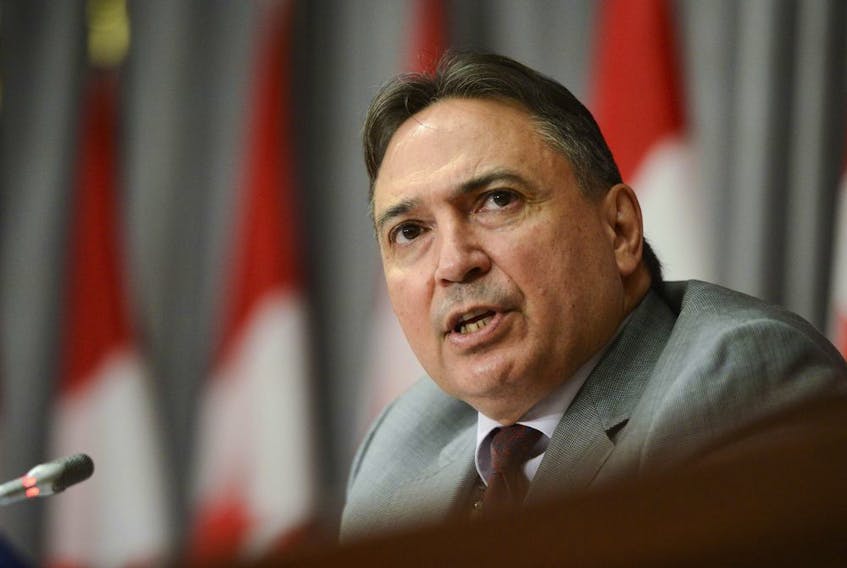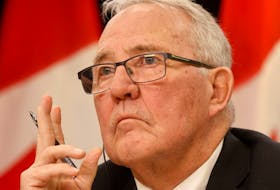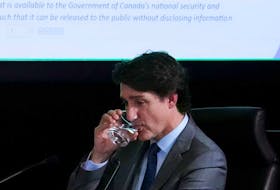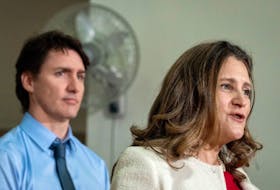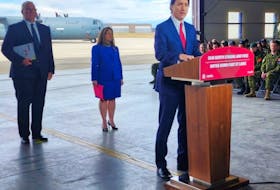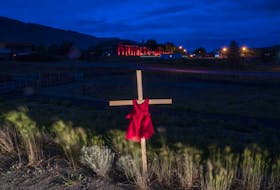Perry Bellegarde, national chief of the Assembly of First Nations (AFN), gave an interview this week in which he staked a claim to some of the flood of cash expected to gush from Parliament when it finally gets back to running the country from beyond Prime Minister Justin Trudeau’s front doorstep.
Bellegarde had a poll to promote , indicating that Canadians profess to support a number of issues advanced by the AFN, including the need for decent housing, access to clean drinking water and adoption of a United Nations declaration on Indigenous rights.
“A majority of Canadians are saying ,’Yes, First Nations issues that we’ve been advocating for for years need to be dealt with,’ ” Bellegarde said.
The surprise would have been if a majority of Canadians, or even a small minority, declared they were against clean water and safe housing. That wouldn’t be a nice Canadian thing to say at all. The question of the UN declaration on Indigenous rights is another matter. I’m willing to bet somewhere between 90 per cent and 99 per cent of Canadians have no real clue what the declaration says, or what the ramifications of adoption would be, and that most of those polled figured it was safer to just nod affirmation rather than get in a debate about it.
You can’t fault Bellegarde for making his case, of course. He’s the head of a large organization with important issues to pursue, and when a prime minister is proclaiming his eagerness to spread around the cash as eagerly as we’ve seen from Trudeau, he’d be derelict in his duty if he didn’t get in there to make his case.
Nonetheless, Bellegarde might want to take a cue from the new Tory leader, Erin O’Toole, and put some consideration into rethinking his image strategy. It’s doubtful that any significant proportion of Canadians are resistant to Indigenous communities having better facilities, safer lives or a more promising future. While there have been many horrific mistakes in the past, it’s safe to say most Canadians recognize that and want to do better. It’s also fair to say no government has ever declared its determination to right those wrongs more loudly or repeatedly than the Trudeau government. Whether it has succeeded to any measurable degree is up for debate, but you can’t question its dedication to declaring its sympathies.
That being the case, Bellegarde and other Indigenous leaders might want to look beyond polls urging Canadians to take their concerns seriously. Solving those concerns is the issue, and there’s lots of evidence that serious people are making serious attempts.
A couple of examples. In Alberta, frequent target of activists intent on denouncing its energy industries, one of the country’s major power suppliers recently reached a deal to sell 40 per cent of a 508-kilometre transmission line to a group of seven Indigenous communities. The Alberta Powerline, energized in 2019, runs from just outside Edmonton to Fort McMurray and was built by Canadian Utilities. Announcing the sale, Nancy Southern, CEO of parent ATCO Group, said the firm was “deeply appreciative of the co-operation and commitment from all of the Indigenous communities along the line, whose centuries-old culture, histories and knowledge helped us in shaping the route.”
In another recent deal, notorious hardline right-wing Premier Jason Kenney, bane of “progressives” everywhere, announced Alberta would provide $93 million in loan guarantees to six First Nations that are part of a consortium building a $1.5-billion natural gas power plant near Edson. The 900-megawatt plant is expected to start operations in 2023. The agreement, said Kenney, “ensures a reasonable level of risk for taxpayers and a reasonable level of equity and cash flow for the First Nations.”
Neither of these agreements is likely to get as much attention as the ongoing dispute over British Columbia’s Coastal GasLink pipeline, which has been caught up in conflict with the Wet’suwet’en community that centres largely on a disagreement between elected chiefs and hereditary chiefs. Five elected Wet’suwet’en councils signed agreements with the company building the 670-kilometre natural gas pipeline from northern B.C. to Kitimat, but hereditary chiefs insist it can’t go ahead without their consent. In May the elected chiefs demanded Crown–Indigenous Relations Minister Carolyn Bennett resign over a memorandum reached with the hereditary chiefs, which they said they wouldn’t honour. But Bennett and the hereditary chiefs kept talking and issued a joint statement in August pledging to keep doing so.
The dispute has sparked blockades, arrests, demonstrations and a great outpouring of angry rhetoric. According to a GasLink construction update in July, progress had been made on seven of eight sections of the line, with land clearing ranging from 69 per cent completion to 100 per cent, except on the 78-kilometre section crossing Wet’suwet’en lands, where only eight per cent had been cleared.
Bellegarde might argue that other Canadians simply don’t understand the cultural and historical issues that enable elected Indigenous leaders and thousands of Indigenous families who support the economic gains the pipeline would provide to be frustrated because of opposition from a handful of chiefs who claim their authority comes from birth. And he’d be right. Not knowing who speaks for Indigenous people is perhaps the greatest barrier to progress on reaching agreements that Canadians, Indigenous and non-Indigenous alike want to see. It’s not a problem Ottawa can solve, however — only Indigenous people can do that.
Bellegarde could do immense good if he helped sort out that dilemma. Polls won’t get him anywhere. Canadians already agree the issues need to be dealt with. They need a path to success, though, and it won’t come from a community divided from within.
National Post
Twitter.com/kellymcparland
Copyright Postmedia Network Inc., 2020

